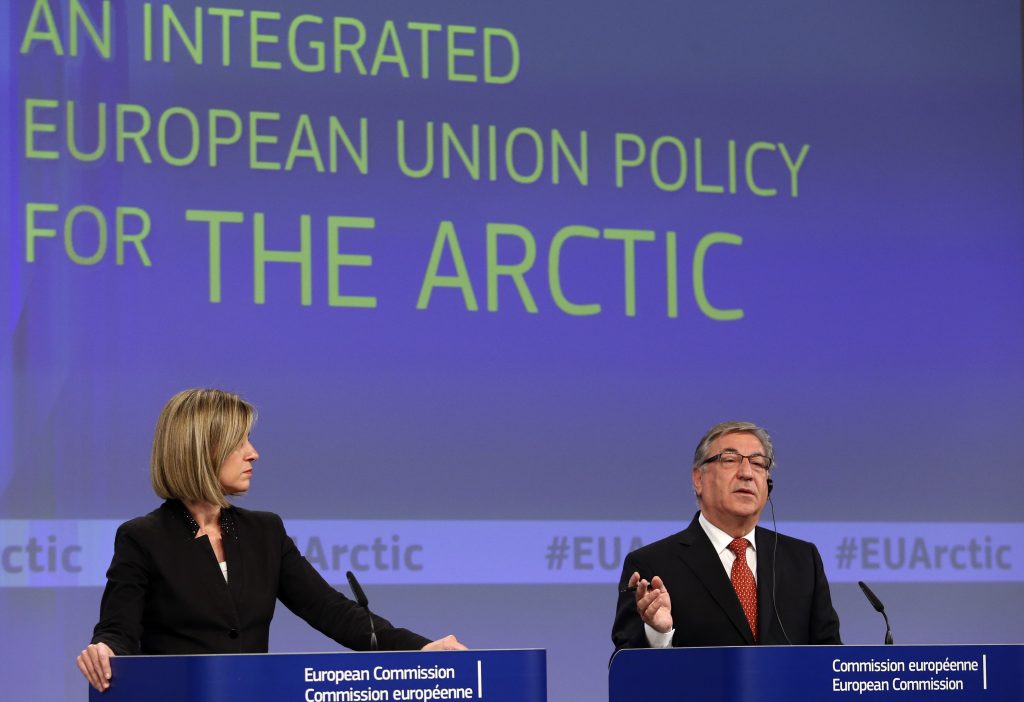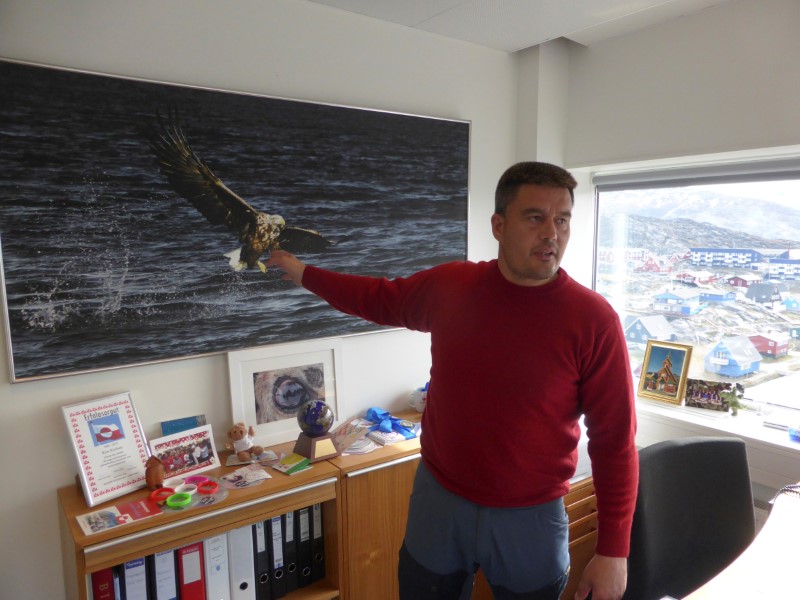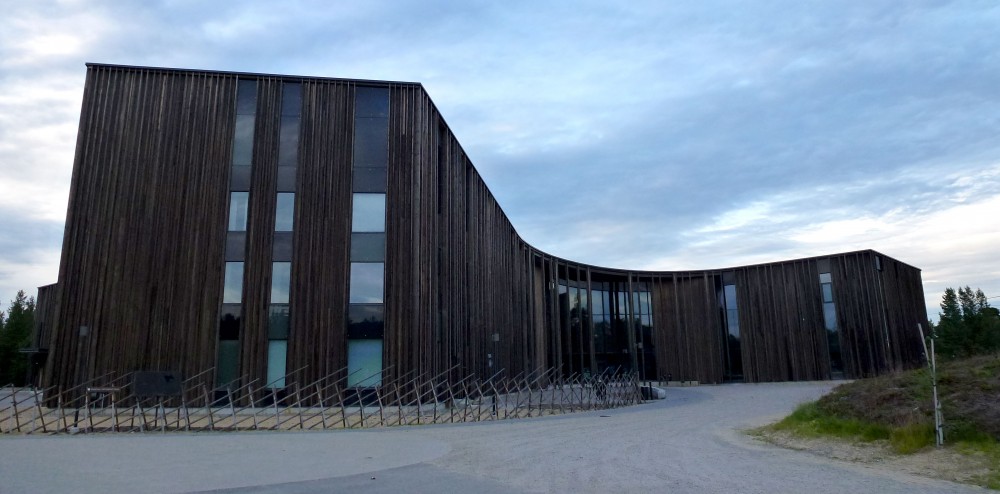The Week Ahead: Bringing the Arctic to Brussels
The European Union is generally unwelcome in the Arctic. But Brussels is finding that its money is.

Finding an EU footprint in the Arctic is not hard. Two of its members, Sweden and Finland, have territory north of the Arctic circle, qualifying them as members of the Arctic Council.
Denmark is in the same club, though its Arctic territory, Greenland, lies outside the union. Even so, Brussels considers it a part of the “EU family,” a designation that comes with a €225 million ($263 million) payment in exchange for giving EU fishermen rights to work its waters for seven years ending in 2020.
Likewise, Norway — at least until we know the details of a Brexit deal — is as close as a country can get to being in the EU without being a full member.
Yet, for all of this, the EU has had a hard time gaining a level of influence in the region that its geography, global clout and budget would seem to warrant.
[The Arctic with European characteristics]
Part of this is self-inflicted; Brussels’ ban on seal imports is an affront to the Inuit, for example. And the decision to place sanctions on Russia in response to the annexation of Crimea has blocked its chances of being admitted as a full-fledged observer to the Arctic Council.
Brussels, however, has not been content with standing outside the Arctic’s door until these issues get resolved. Its Arctic strategy, published in 2016, chose instead to open its own door to the Arctic, by inviting the region to take part in a dizzying array of funding programs. On Monday, in Brussels, the European Commission, the EU’s executive branch, will seek to institutionalize this approach when it holds the inaugural Arctic Stakeholder Conference.
The gathering builds on the Arctic Stakeholder Forum, a series of meetings established by the 2016 strategy to address under-investment in the region. During the last of these sessions, held in January, representatives from the region handed over a report containing their recommendations for things like where the EU’s money should be invested (digital infrastructure and transport ranked highly) and for ways to make it easier to apply for funding for individual projects.
[As Brexit goes, so goes Greenland’s relationship with the EU]
The report also admitted that, despite dissatisfaction with Brussels’ past missteps, the EU, or its money at least, is important for the future of the region. “There was common recognition in the consultation that EU programs are important for the development of the Arctic region,” it stated.
For Brussels, walking softly and waving a big wallet may turn out to be the most effective Arctic policy of them all.
Hunter-thinker

Also this week, Greenland’s premier, Kim Kielsen, will begin efforts to reassemble a majority in the Inatsisartut, the national assembly, before the opening of the autumn legislative session, on September 30.
Kielsen, who began serving a second term after elections in April, lost his majority earlier this month amidst accusations that he lied to coalition partners about an impending deal with Denmark to provide funding for two airport expansions.
The withdrawal of Partii Naleraq from what had been a four-party coalition, leaves Kielsen with the support of 13 seats in the 31-member Inatsisartut. This may not be all bad: Partii Naleraq’s exit rids Kielsen’s cabinet of a populist party that disagreed with the premier on a number of key issues, including the airport expansion. The two parties he will speak with about joining the cabinet, Demokraatit and IA, can secure him a larger majority than Partii Naleraq’s votes gave him.
[Construction plans leave the fate of Greenland’s main airport up in the air]
Politically, an agreement with either is realistic: He governed in coalition with Demokraatit from 2014 until 2016, and then with IA from 2016 until the election, and both say they agree on enough with Kielsen and his Siumut party to make an agreement possible.
In order to successfully woo them this time, however, he will need to address a series of a criticisms of personal criticisms that have emerged in the wake of Partii Naleraq’s accusations, including a reportedly authoritarian leadership style.
Kielsen is expected to sit down to negotiations on Thursday, after having been away from Nuuk for several days to hunt reindeer. Opponents point to his decision to leave the capital during a period of political turmoil as proof that he is not fit to run a country.
[Greenland’s two largest parties have headed their separate ways]
Doing so, though, is neither out of character for Kielsen, an avid hunter and professional fisherman, nor is it a sign that the political situation is out of mind, according to his backers.
“He is the type of man who thinks best when he is alone,” a spokesperson told KNR, a broadcaster. His potential partners will want guarantees that he is not the kind of man who acts best on his own as well.
Res Arctica

On Monday, legislators from the eight Arctic countries gather in Inari, in Finnish Lapland, for the biennial meeting of the Conference of Arctic Parliamentarians.
Typically, the three-day gathering, which is also attended by legislators from Arctic Council observer states, has two goals. Firstly, it is an opportunity for those who attend to explain issues facing the Arctic regions of their individual countries, and to look for inspiration for how to address them. Similarly, by giving lawmakers from non-Arctic countries the chance to speak, the conference hopes to learn what their interests in the region are.
Secondly, it gives lawmakers from the region the chance to come up with a list of issues they feel their legislatures, as well as those representing their countries abroad, should be paying most attention to.
[After 20 years, the Arctic Council reconsiders the role of observers]
Topics of discussion taken up during the meetings ring familiar (this year, the conference will hear reports about digitalization, climate change, corporate social responsibility and social well being), but the approach, according to those who attend, reflects the fact that those doing the talking are popularly elected representatives.
“The topics we discuss don’t surprise anyone,” says one veteran attendee, “but what we have to say about them sometimes does.”
The Week Ahead is a preview of some of the events related to the region that will be in the news in the coming week. If you have a topic you think ought to be profiled in a coming week, please email ne**@ar*********.com.